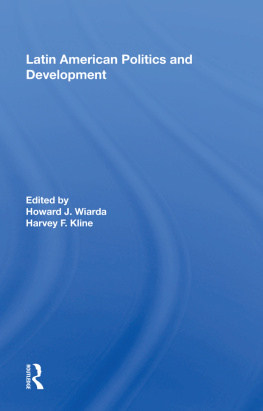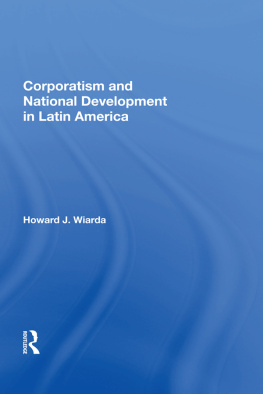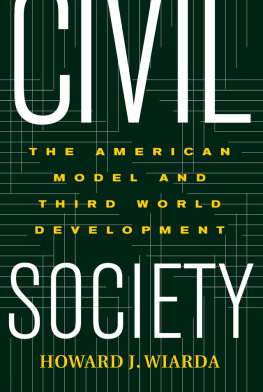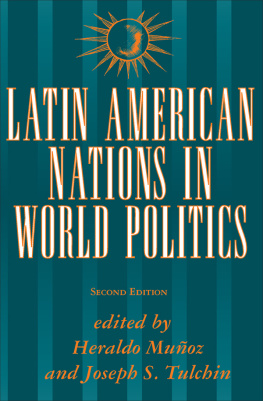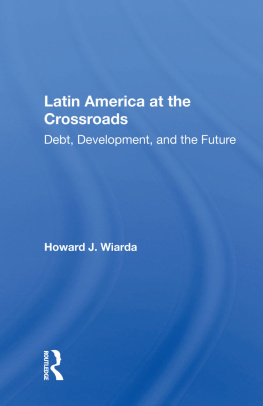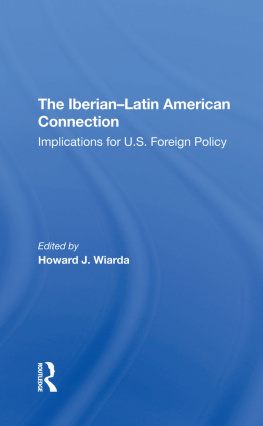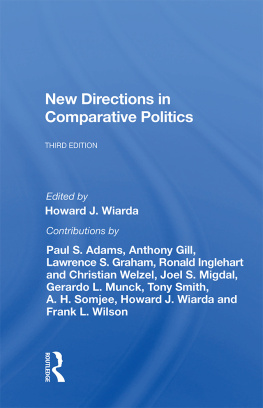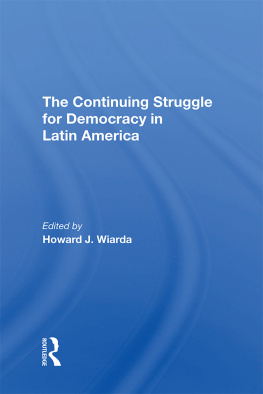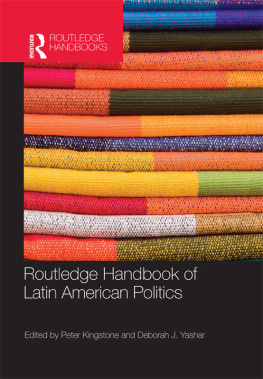First published 2000 by Westview Press
Published 2018 by Routledge
52 Vanderbilt Avenue, New York, NY 10017
2 Park Square, Milton Park, Abingdon, Oxon OX14 4RN
Routledge is an imprint of the Taylor & Francis Group, an informa business
Copyright 2000 by Taylor & Francis
All rights reserved. No part of this book may be reprinted or reproduced or utilised in any form or by any electronic, mechanical, or other means, now known or hereafter invented, including photocopying and recording, or in any information storage or retrieval system, without permission in writing from the publishers.
Notice:
Product or corporate names may be trademarks or registered trademarks, and are used only for identification and explanation without intent to infringe.
Library of Congress Cataloging-in-Publication Data.
Latin American politics and development / [edited by] Howard J. Wiarda, Harvey F.
Kline.5th ed.
p. cm.
Includes bibliographical references and index.
ISBN 0-8133-3769-0 (pbk)
1. Latin AmericaPolitics and government. I. Wiarda, Howard J., 1939 II. Kline,
Harvey F.
F1410 .L39 2000
320.98dc21 00-061435
ISBN 13: 978-0-367-00731-7 (hbk)
Dedicated to the Memory of John Martz and Enrique Baloyra Contributors to Previous Editions, Friends and Scholars Who Dedicated Their Lives to the Study of Latin America Adios, queridos colegas!
The first edition of this book was published in 1979, the second in 1985, the third in 1990, the fourth in 1996, and now the fifth in the new millenium year of 2000. The issues we have sought to examine in all five editions include why Latin America is different from the United states, why it lagged behind economically and politically, how societies cast historically in a medieval and semifeudal mode have gone about achieving modernization and development, what the dynamics and conflicts of Latin American politics are, and what paths of national development (evolutionary or revolutionary; authoritarian, Marxist or democratic; capitalist, socialist, or statist) the distinct countries of the area have followed. These are large, meaty issues; their importance goes beyond the geographic confines of Latin America.
Each of the five editions of the book has reflected the major dynamic changes occurring in Latin America itself. The decade of the 1970s was a period of authoritarianism and repression in much of the region, widespread human rights abuses, and interpretation about the areacorporatism, dependency theory, and bureaucratic-authoritarianismthat reflected scholars' pessimism about Latin America's future. The 1980s was a period of democratization throughout Latin America, greater optimism about the area's political future (even though the economic prospects continued poor), and newer interpretations that stressed transitions to democracy.
In the early 1990s there was considerable agreement (labeled the "Washington consensus") between the United States and Latin American on goals for the region: democracy, economic liberalization, and free trade. By this point most of the authoritarian regimes of the area had given way and, with the collapse of the Soviet Union, Marxism-Leninism had become less attractive; democracy and liberalism seemed the only viable option. But by the end of the 1990s, although democracy, economic reform, and freer trade were still high on the agenda, a number of cracks had appeared in the prevailing consensus. Democracy was still limited and not working well in quite a few countries; much of Latin America had achieved electoral democracy but not liberal or participatory democracy. Economic reform continued, but the neoliberal agenda had resulted in widespread unemployment and privation in many countries. Trade barriers continued to fall in Latin America, but in the United States protectionist political pressures prevented bold new trade initiatives.
While Latin America over this thirty-year period has gone through its political and economic ups and downs, its society has been massively transformed. These are no longer the "sleepy," "backward," "underdeveloped" countries of cartoon and movie stereotypes. Since 1960 Latin America as a whole has gone from 70 percent rural to 70 percent urban and from 70 percent illiteracy to 70 percent literacy. These figures reflect the massive social changes underway throughout the area as well as the transformation from a peasant-agricultural economy to a more modern, industrial, and diversified one. In the mid-1970s seventeen of the twenty countries were authoritarian, but today nineteen of the twenty (all except Cuba, and even there major changes are likely soon) are democraticincomplete democracies, but certainly better than the human rights-abusing regimes of earlier decades. Economically quite a number of the countries are booming, with miraculous or East Asian-level growth rates, but others are still mired in poverty. At the same time, a host of new issuesrising crime and insecurity, social inequality, and globalizationhave come to the fore. So, as always, Latin America reflects a mixture of successes and failures, of traditional and modern features of mixed and often crazy-quilt regimes in an always-changing, dynamic context.
No longer a group of backward, underdeveloped countries, Latin America is one of the most exciting regions of the globe for the comparative study of economic, social, and political change. In previous decades the choice of developmental models seemed wide open, representing diverse routes to modernization, but by now the democratic-mixed economy route seems the only one conceivable, although with great variation still among the countries of the region. Virtually every social, economic, and political issue, process, and policy present in the world can be found in Latin America. It remains an exciting, innovative ever-changing, endlessly fascination living laboratory for study, travel, and research.
Not only is Latin America an interesting area to study, but it has become increasingly important to the United States. Mexico is now the United States's second largest (after Canada) trading partner in the world. Hispanics have become the largest minority in the United States and are voting in increasing numbers. On a host of new, hot issuesdrugs, trade, immigration, tourism, pollution, investment, the environment, democracy, human rightsthe United States and Latin America have become increasingly intertwined and interdependent. At the same time both Europe and Asia are also increasing their trade with and interest in Latin America and are often competing with the United States for influence.
This book offers in its introduction to the area a broad, region-wide overview of the patterns and processes of Latin American history, politics, society, and development. It then proceeds to a detailed country-by-country treatment of all twenty Latin American countries (the smaller former British and Dutch colonies of the region are not included, and of the former French colonies only Haiti is considered). Major countries like Argentina, Brazil, Chile, Colombia, Mexico, Peru, and Venezuela receive extended coverage, and the smaller countries receive complete but somewhat briefer treatment. Each country chapter is written by a leading specialist in the field; to facilitate comparisons between countries we have asked each of our authors as far as feasible to use a common outline and approach. Throughout, we emphasize both the unique features of each country as well as the common patterns and processes that exist; instructors thus have maximum flexibility in the selection of which countries to study and which themes or developmental models to emphasize.


